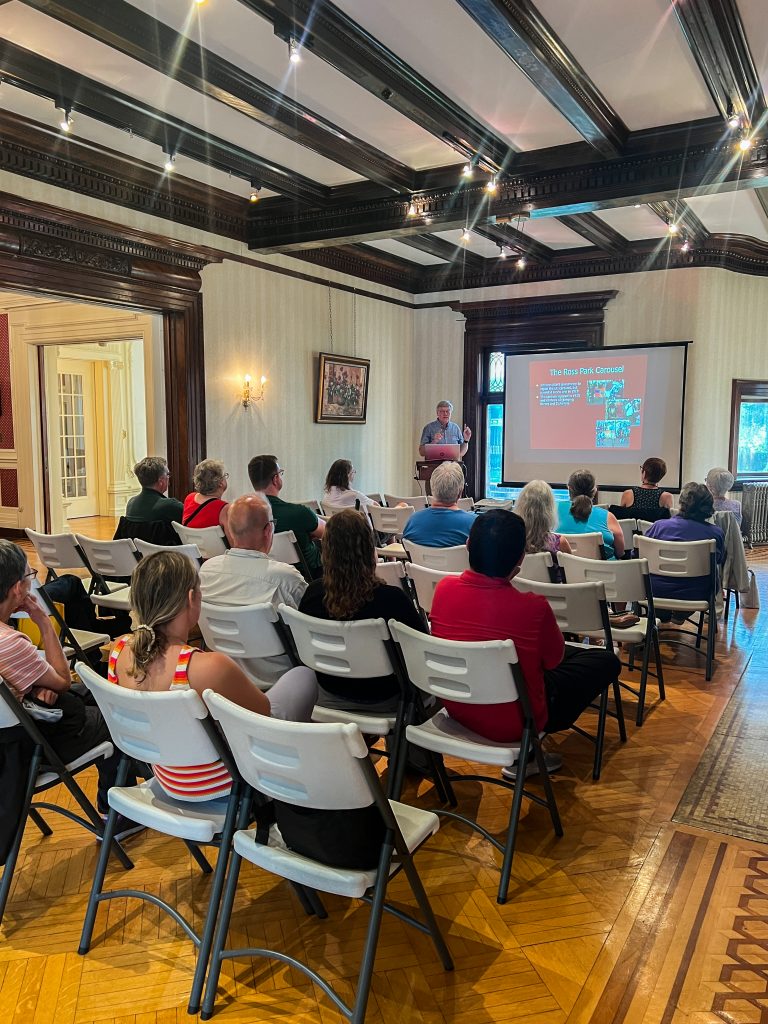Gerry Smith, Binghamton University ’81 and a former Broome County historian, visited the historic Kilmer Mansion on Sept. 14 to give a lecture on George F. Johnson — a leading figure in Binghamton’s industrial history — for the Mansion’s monthly “Wine and History” Event.
With the event hosted inside the living room of a 19th century victorian home, local members of the community streamed in to hear more about how George F. Johnson played a role in the growth of the Triple Cities now known as Endicott, Johnson City and Binghamton.
As the current president of HistorySmiths, a research and consulting organization and former president board of trustees for the Association of Public Historians of New York State, Smith gave a detailed presentation on the impact Johnson and colleagues played in the local community. A number of attendees were descendants of family members that worked for Johnson, and were inspired by the numerous acts of kindness bestowed on their ancestors by what Smith deems “socialists with a lowercase s.”
After arriving on the train from Boston in 1881, Johnson witnessed the economic unrest in the surrounding communities and was determined to make a change.
Smith elaborated on Johnson’s industrial outlook on the city.
“As one of the founders of Endicott Johnson Shoe Company that would eventually employ over 20,000 people here and manufacture 53 million pairs of shoes each year, his belief was that we are all part of the community and should work together to solve our problems,” Smith said during the event.
With workers coming from Pennsylvania coal mines to European cities, the head manufacturers opened up hospitals — like the still-standing UHS Wilson Medical Center — and community centers, funded churches and built carousels in nearby neighborhoods in an effort to provide their employees with a healthy work-life balance.
Vowing to uplift an entire community of hardworking people, Johnson purchased nearby parks and gave them back to the locals on the condition that there would never be fencing erected to keep people out. Johnson was a man that believed wholeheartedly in providing for the individuals who helped establish his success.
As Smith pointed out later in his presentation, Johnson’s humanitarian practices were not limited to infrastructure.
Introducing his Square Deal Program, Johnson introduced a policy that mandated decent wages, health care and housing for his employees on the condition that they would remain productive and loyal.
Johnson was also responsible for shortening the workday to eight hours instead of the nine and a half hours that factory workers had been used to at the time. Smith believes that Johnson was simply following “The Golden Rule.”
Alisha Fisher Swietzer, executive director of the Kilmer Mansion, commented on the importance of Gerry Smith’s presentations and the significance it plays to the Kilmer Mansion as a historical site.
“Smith’s presentations have been great for building the mansion’s nonprofit organization,” Swietzer said. “It started out as history night, and we’d think about what would be best for our crowd. Then we added the wine, and it’s been great.”
A landmark on Riverside Drive on the West Side of Binghamton and the previous home of the famous Kilmer family, the Kilmer Mansion frequently hosts guided tours, private events and guest appearances.
Both Swietzer and Smith believe strongly in the importance of protecting the local histories of cities like Binghamton, and the Kilmer Mansion has become a pivotal place in safeguarding that mission for the Triple Cities.
“There are so many historical details about Binghamton of which many residents are not aware,” Smith said. “I continued to research history because it allowed me greater insight into past lives and held out the need to understand our past so that we might shape a brighter future.”
BU students also commented on their relationship with the local history and missions like that of the Kilmer Mansion.
James Galeno-Budion, a sophomore majoring in English, explained why he thinks preserving local history is necessary.
“Learning about the history of Binghamton is such an important initiative,” Galeno-Budion said. “Keeping people informed is imperative to local culture.”
Swietzer described her reasoning behind keeping Kilmer Mansion alive and thriving.
“Our goal is to preserve this home and have it be a place that brings people together,” Swietzer said.



